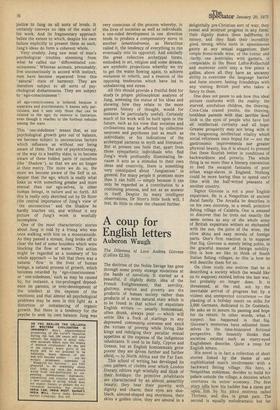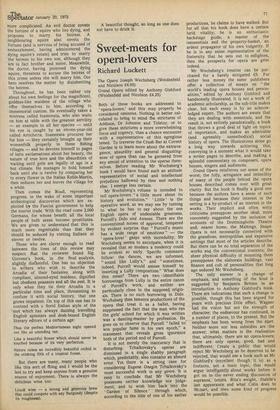A coup for English letters
Auberon Waugh
The Dilemma of Love Andrea Giovene (Collins E2.50) The doctrine of the Noble Savage has gone through some pretty strange mutations at the hands of novelists. It started as a beautiful, if slightly dotty, idea of the French Enlightenment, that servility, gluttony, avarice and poverty are the products of human society rather than products of a more natural state which is to be found in that school of expatriate English writers — usually homosexual, often drunk, always poor — which will settle like a flock of starlings in any depressed community overseas and extol the virtues of poverty while living like kings and indulging their peculiar sexual appetites at the expense of the indigenous inhabitants. It used to be Italy, Cyprus and Greece, but as English homosexuals grow poorer they are driven further and further afield — to North Africa and the Far East.
This school of writing has developed its own pattern of clichés over which London literary editors sigh wistfully and think of their holidays: the primitive inhabitants are characterised by an almost unearthly beauty; they bear their poverty with dignity and charm; their eyes are sloeblack, almond-shaped and enormous, their skins a golden olive, they are amoral in a delightfully pre-Christian sort of way; they resent and mistrust progress in any form; their dignity makes them indifferent to money, and they flash their incredibly good, strong, white teeth in spontaneous gaiety at any sexual suggestion; their simple home-made wine, of the colour and clarity one associates with garnets, is comparable to the finest Lafite-Rothschild and moreover costs only a few pence a gallon; above all they have an uncanny ability to overcome the language barrier and form sincere, lasting friendships with any visiting British poof who takes a fancy to them.
One does not pause to ask how this ideal picture conforms with the reality: the starved, scrofulous children, the thieving, Coca-Cola crazed youths, the thieving, toothless parents with that terrible dead look in the eyes of people who have lost all intellectual curiosity and all hope. Greater prosperity may not bring with it the burgeoning intellectual vitality which social reformers once hoped for — nor the gastronomic improvements nor greater physical beauty, but it is absurd to pretend that these flourish better in conditions of backwardness and poverty. The whole thing is no more than a literary convention to feed the escapist fantasies of poor urban wage-slaves in England. Nothing could be more boring than to spend one's time with the half-witted peasants of another country.
Signor Giovene is not a poor English expatriate. He is a Neapolitan of ancient ducal family. The Arcadia he describes is on his own doorstep, in a small, primitive fishing village of Calabria. One is amazed to discover that he trots out exactly the same noises as any of the whole army of British expatriate writers so enchanted with the sun, the price of the wine, the olive skins and easy morals of foreign parts. One's first reaction is to suppose that Sig. Giovene is merely being polite, in the graceful manner of foreign nobility: this is how we like to think of South Italian fishing villages, so this is how he will describe them for us.
On close study one notices that he is describing a society which (he would like us to suppose) existed before the last war, but probably no longer does. It is threatened, at the end, not by the inevitable arrival of progress but by a violent and unexpected occurrence — the planting of a holiday resort on stilts for 2,000 Germans, dedicated to Dr Goebbels. He asks us to mourn its passing and hope for its return. In other words, what I suspect has happened is that Sig. Giovene's memories have adjusted themselves to the time-honoured fictional perspective. He honestly thinks that societies existed such as starry-eyed Englishmen describe. Quite a coup for English letters.
His novel is in fact a collection of short stories linked by the theme of one sophisticated man's involvement with a backward fishing village. His hero, a Neapolitan nobleman, decides to build his palace outside the village, a decision which overturns its entire economy. The first story tells how his builder has a curse put upon him by his jilted mistress called Thirteen, and dies in great pain. The second is equally melodramatic but far more complicated. An evil 'doctor covets the fortune of a squire who lies dying, and proposes to marry his heiress. A neighbouring squire also covets the fortune (and is nervous of being accused of embezzlement, having administered the dying squire's estate) and tries to marry the heiress to his own son, although they are in fact brother and sister. Meanwhile, the doctor, having poisoned the dying squire, threatens to accuse the heiress of this crime unless she will marry him. Our hero resolves the matter by disinheriting the heiress.
Throughout, he has been rather coy about his own feelings for the magnificent, goddess-like maidens of the village who offer themselves to him, according to immemorial custom. He eventually takes a mistress called Inamorata, who also waits on him at table with the greatest servility — an example to all her species — until his eye is caught by an eleven-year-old called Arrichetta. Inamorata procures her for him — they certainly brought up their womenfolk properly in these fishing villages — and he devotes himself to pages of latin exclamations about her beauty, the nature of true love and the absurdities of waiting until girls are legally of age in a hot climate. He manages to hold himself back until she is twelve by comparing her to every flower in the Italian Keble-Martin, then seduces her and leaves the village for a while.
Then comes the Road, representing progress, in the wake of some important archeological discoveries which are exploited by the Fascist government to help the tourist trade. With the road come 2,000 Germans, for whose benefit all the local people of both sexes become prostitutes. We are given to understand that this is much more regrettable than that they should be seduced by visiting Italians at eleven or twelve.
Those who are clever enough to read between the lines of this review may suspect that the reviewer found Sig. Giovene's book, in the final analysis, slightly diseasteful. One has no objection to writers who wish to describe the Arcadia of their fantasies, along with compliant, almond-eyed maidens, dignified but obedient peasants and all the rest. It is only when they tie their Arcadia to a particular time and place, threatening to confuse it with social history, that one grows impatient. On top of this one has to contend with e florid Italian style of the 'sort which has always dazzled travelling English spinsters and desk-bound English literary editors of a certain age: Thus the perfect Mediterranean night opened out like an unending tan.
Like a beautiful flower which should never be touched because of its very perfection.
Nature raises an incredibly beautiful orchid in the stinking filth of a tropical forest.
But there are many, many people who like this sort of thing and I would be the last to try and keep anyone from a genuine source of enjoyment. There is always the delicious wine too: Licudi wine — a strong and generous brew that could compete with any Burgundy (despite its roughness). A beautiful thought, so long as one does not have to drink it.



































 Previous page
Previous page